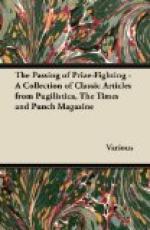Alfred Lyttelton: An Account of his Life, by EDITH LYTTELTON (LONGMANS), is a most fascinating book. Mrs. ALFRED LYTTELTON might perhaps have contented herself with writing a formal biography of her husband. It would have been difficult for her, but she might, as I say, have done it. Instead of this she takes her readers by the hand in the friendliest manner and admits them with her into the heart and soul of the man with whom she was for twenty years associated. She shows him as what he was, a noble and upright English gentleman, straightforward and tender-hearted, and beloved in a quite exceptional measure by all who were privileged to be his friends. I can only be grateful to Mrs. LYTTELTON for having interpreted her duty in this manner, and for having carried it out with so sure a hand. As I read her pages I saw again in my mind’s eye the loose-limbed, curly-headed young son of Anak as he swung down Jesus Lane, Cambridge, or as he witched the world with noble cricketing at Fenner’s or at Lord’s. It is good to be able to remember him. His Eton tutor described him as being “like a running stream with the sun on it,” and there was, indeed, a charm about him that was irresistible. Mrs. LYTTELTON devotes a beautiful chapter to the memory of ALFRED’S first wife, LAURA, who died after one short year of happiness. “She was a flame,” says Mrs. LYTTELTON, “beautiful, dancing, ardent, leaping up from the earth in joyous rapture, touching everyone with fire as she passed. The wind of life was too fierce for such a spirit—she could not live in it. Surely it was Love that gathered her.” I have only one little bone to pick, and that not with Mrs. LYTTELTON, but with Lord MIDLETON, who in a page or two of reminiscences describes as one of ALFRED’S triumphs at the Bar his appearance as counsel for the Warden of Morton, Mr. GEORGE BRODRICK. The Warden, having said something offensive about Mr. DILLON, was hailed before the Parnell Commission for contempt of court. ALFRED put in an affidavit by the Warden, in which the whole thing was said to be a joke, and in his speech he chaffed Mr. REID (now Lord LOREBURN), who was counsel for Mr. DILLON, for being a Scotsman, with a natural incapacity for seeing a joke. So far Lord MIDLETON; but he omits Mr. REID’S crushing retort. “Even a Scotsman,” said Mr. REID, “may be pardoned for not seeing a joke which has to be certified by affidavit.”
* * * * *
Mr. JEFFERY E. JEFFERY has been playing cheerful tricks on the British public. We must forgive him, because he has for a long time been doing far worse than that to the Huns; but it is undeniable that in following the winding trail of his beloved guns we are in no small danger of losing our sense of direction. This is because along with imaginary tales, some of them written before August, 1914, when of course he could not fix precisely the chronology and locality of his fights, he has mixed almost indiscriminately




